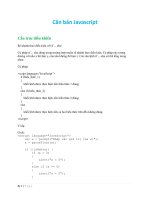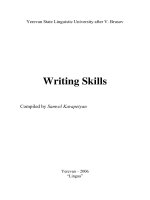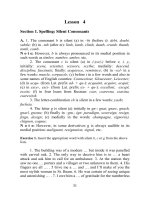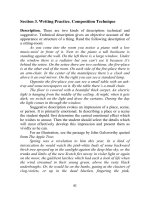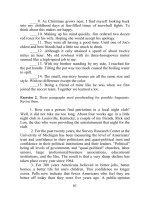Tài liệu Developing writting skills 1 part 2 doc
Bạn đang xem bản rút gọn của tài liệu. Xem và tải ngay bản đầy đủ của tài liệu tại đây (195.83 KB, 10 trang )
The forest ranger, an expert in forest fire control, talked to
the campers about safety in the woods. – An expert in forest fire
control, the forest ranger talked to the campers about safety in the
woods. (appositive phrase)
Note that the part of the sentence placed first acquires a
special stress. The appositive phrase in this case seems to have
acquired a casual meaning, rather like: Being an expert in forest fire
control, the forest ranger …
3) A subordinate clause. When writing in complex sentences,
variety can be achieved by putting the subordinate clause before the
main clause. One should remember, however, that in this case the
idea expressed by the subordinate clause takes on a greater emphasis,
and one should therefore use this inversion with discrimination:
e.g. The gardener had to plant roses when they ran out of
carnations. - When they ran out of carnations, the gardener had to
plant roses.
Exercise 1. Rewrite the following sentences, beginning them with the part
of the sentence mentioned in parentheses.
1. Mr. Boyd was angry and began to defend his reputation
with strong argument. (single-word modifier) 2. The pioneer was
strong and healthy and lived to be 112 years old. (single-word
modifiers) 3. Many philosophy students read Plato, the author of
Socratic dialogues. (appositive phrase) 4. Shepherds are brilliant
climbers, hard-working and tireless. (single-word modifiers) 5.
Cousteau, a tireless researcher, began experimenting with skin-
diving in 1936. (appositive phrase) 6. The mosaics at the University
of Mexico, made by outstanding artists, are one of the most beautiful
things to see in Mexico City. (participial phrase) 7. Their going was
fairly easy at first. (a prepositional phrase) 8. The soft and crumbling
snow made each step a potential disaster. (single-word modifiers) 9.
A student may want to "map" ideas in his or her notebook to
visualize a concept or theory. (infinitive phrase) 10. Eggbert ate the
eggs even though he disliked them. (a subordinate clause) 11. Ending
the solemn atmosphere the children laughed in spite of the warning.
(prepositional phrase) 12. Leaves are falling, coming down in
streams of gold and brown. (participial phrase)
11
Exercise 2. Complete the following sentences, beginning them with the part
of the sentence mentioned in parentheses.
1. …, the storm roared across the countryside although it
wasn’t forecast. (a subordinate clause) 2. …, Mr. Caine obviously
had a grave illness. (participial phrase) 3. …, Jane listened to music.
(infinitive phrase) 4. …, advertisers both flatter and insult women in
their campaigns. (a single-word modifier) 5. …, Jim sped down the
highway at 80 miles per hour. (infinitive phrase) 6. …, she called her
friend. (participial phrase) 7. …, the reader is insulted by the trite
and shallow editorial. (prepositional phrase) 8. …, Larry brought out
the industrial can of RAID ant spray. (participial phrase) 9. …, Jim
hit the ball. (prepositional phrase) 10. …, Dr. Jones was on-call 24
hours a day. (appositive phrase) 11. …, the skydiver, in free-fall
realized she forgot her parachute. (single-word modifiers) 12. … my
cousin Danny plays a croquet. (prepositional phrase) 13. …, one
should walk in the woods rather than read a book. (infinitive phrase)
14. …, I was just getting out of the shower. (a subordinate clause)
15. …, the troll waited for the English professor. (prepositional
phrase) 16. …, the boy pleaded innocence with his mom. (gerundial
phrase) 17. …, the swimmer struggled to the shore as waves crashed
into him. (participial phrase) 18. …, we were tired and hungry when
we arrived. (a subordinate clause)
Section 3. Writing Practice.
Reproduction Writing
Reproduction is a traditional method of teaching foreign
languages, particularly their written form. Learning a language
depends largely upon our ability to imitate; it is through imitation,
through repeated copying of ready-made patterns of grammatical and
lexical usage that we achieve success in mastering a language.
However, language is in its very essence creative; thus at this
stage, reproductions should form a balanced synthesis between
imitation and creation. They are not confined to re-telling, though the
student is required to render the story in a version which remains on
the whole faithful to the original. In addition, the student may be
12
asked to give his opinion of the story, to comment upon some
episode, etc.
Exercise. Read the passage and do the assignments given below.
Miss Robinson had been taking driving lessons and trying to
pass her driving test for several years, but she had failed every time
because she always became too excited and did silly things when she
was driving a car. Now she was taking her test again, but she made
so many mistakes that she was sure that she had no chance of
passing, so she was surprised when the examiner nodded at the end
of her test and said, “All right, Miss Robinson, I’m going to pass
you.”
The next morning she went out in her car alone for the first
time. Her face was red, her hands were sweating and she was hardly
able to believe that it was no longer necessary for her to have a good
driver with her in the car whenever she went out in it.
She came to the first traffic lights and was very glad when she
managed to stop the car quite smoothly and at the right place in the
street.
While she was waiting for the lights to change from red to
green, an old lady came to the window of her car, and when Miss
Robinson opened the window and looked out, the old lady asked
whether she was going into the town.
“Yes,” Miss Robinson answered, “I am. I am going to the
Public Library.”
“Will you please take me as far as the market-place?” The old
lady asked. “I have an appointment at the hospital, and there isn’t a
bus for another hour.”
Miss Robinson had still not really understood that at last she
had passed her test, and now she surprised the old lady very much by
answering, “I’m very sorry, but I can’t drive.”
(From Intermediate
Comprehension Pieces by L.
A. Hill)
13
Assignment 1. Answer the following questions.
1. Why did Miss Robinson think that she would fail her test
again? 2. What had Miss Robinson had to do before she passed her
test, which she did not have to do after she passed it? 3. Why did the
old lady speak to Miss Robinson? 4. Why was the old lady very
surprised when Miss Robinson said she could not drive? 5. Why did
Miss Robinson say that she couldn’t drive?
Assignment 2. (a) Reproduce the story, including a detailed answer to
questions 4 and 5.
(b) Compose a story for the old lady to tell her friends in the evening after
the incident. Begin it in the following way: “I had a very strange experience
this afternoon. I was going to town and wanted a lift because … .” Let the
old lady also explain why she went up to Miss Robinson’s car, how the girl
at the wheel looked, and what she thought of her behaviour.
14
Lesson 2
Section 1. Spelling: Consonant Doubling
A. 1. Words are spelled with –ll-, -ff-, -ss-, -zz-:
a) In the final position in monosyllables after short vowels
represented by a single letter:
-ll-: cell, fill, pull.
-ff-: stiff, stuff, Jeff.
-ss-: kiss, mess, fuss.
-zz-, mainly in onomatopoeic words: buzz, fizz, jazz.
b) Also in some words after long vowels:
-ll- (a or o): ball, tall, roll.
-ff- (a or o): chaff, staff, off.
-ss- (a in five words): brass, glass, class, pass, grass.
c) In unstressed final syllables: tariff, compass.
2. Words are spelled with –bb-, -dd-,-tt-, -gg-, -pp-, ll-, -ff-, -zz-
before the final –le when preceded by a stressed short vowel if it is
represented by a single letter: babble, pebble; fiddle, meddle, brittle,
settle; struggle; apple, dapple; ruffle, shuffle; dazzle, puzzle.
Exercise 1. Join up the left parts of the proverbs with the right ones so that
they make sense and find their Armenian equivalents:
1. I’ll trust him no farther than a. between asses but kicks.
2. Buy the cheapest market b. and ride out tomorrow.
3. Don’t curse the crocodile’s mother c. must pay the fiddler.
4. He who falls today d. have stiff horns.
5. A rolling stone e. all beer and skittles.
6. No weather is ill, f. before you cross the river.
7. Old oxen g. ‘tis folly to be wise.
8. One man’s loss h. makes a brittle wife.
9. Nothing passes i. I can throw a millstone.
10. Where ignorance is bliss j. gathers no moss.
11. They that dance k. may rise tomorrow.
12. A brilliant daughter l. if the wind be still.
13. Life is not m. is another man’s gain.
14. You saddle today n. and sell in the dearest.
15


